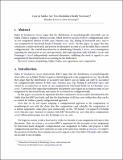Case in Sakha: are two modalities really necessary?
Author(s)
Levin, Theodore; Preminger, Omer
Download11049_2014_9250_ReferencePDF.pdf (318.7Kb)
PUBLISHER_POLICY
Publisher Policy
Article is made available in accordance with the publisher's policy and may be subject to US copyright law. Please refer to the publisher's site for terms of use.
Terms of use
Metadata
Show full item recordAbstract
Baker and Vinokurova (2010) argue that the distribution of morphologically observable case in Sakha (Turkic) requires a hybrid account, which involves recourse both to configurational rules of case assignment (Bittner and Hale 1996; Marantz 1991; Yip et al. 1987), and to case assignment by functional heads (Chomsky 2000, 2001). In this paper, we argue that this conclusion is under-motivated, and present an alternative account of case in Sakha that is entirely configurational. The central innovation lies in abandoning Chomsky’s (2000, 2001) assumptions regarding the interaction of case and agreement, and replacing them with Bobaljik’s (2008) and Preminger’s (2011) independently motivated alternative, nullifying the need to appeal to case assignment by functional heads in accounting for the Sakha facts.
Date issued
2014-07Department
Massachusetts Institute of Technology. Department of Linguistics and PhilosophyJournal
Natural Language & Linguistic Theory
Publisher
Springer Netherlands
Citation
Levin, Theodore, and Omer Preminger. “Case in Sakha: Are Two Modalities Really Necessary?” Nat Lang Linguist Theory 33, no. 1 (July 2, 2014): 231–250.
Version: Author's final manuscript
ISSN
0167-806X
1573-0859